2010年安徽省中考英语试题及答案
- 格式:doc
- 大小:149.50 KB
- 文档页数:14

2010-2019年安徽省中考英语试卷及答案(共10套)目录1、2010年安徽省中考英语试卷及答案2、2011年安徽省中考英语试卷及答案3、2012年安徽省中考英语试卷及答案4、2013年安徽省中考英语试卷及答案5、2014年安徽省中考英语试卷及答案6、2015年安徽省中考英语试卷及答案7、2016年安徽省中考英语试卷及答案8、2017年安徽省中考英语试卷及答案9、2018年安徽省中考英语试卷及答案10、2019年安徽省中考英语试卷及答案2010年安徽省初中毕业学业考试英语第一部分听力(共五大题,满分30分)Ⅰ.关键词语选择(共5小题;每小题1分,满分5分)你将听到五个句子。
请在每小题所给的A、B、C三个选项中选出一个你所听到的单词或短语。
每个句子读两遍。
1.A.fix B.fit C.fat2.A.effort B.offer C.record3.A.head B.held C.heard4.A.swimming B.skating C.shopping5.A.send up B.set up C.save upⅡ.短对话理解(共10小题;每小题1分,满分10分)你将听到十段对话,每段对话后有一个小题。
请在每小题所给的A、B、C三个选项中选出一个最佳选项。
每段对话读两遍。
6.What are they talking about?7.Which sport does Carl like?8.Where has Sandy just been?9.What would Lucy like to have?10.Where does the conversation most probably take place?11.What are they going to do this weekend?A.To play chess.B.To play volleyball.C.To play tennis.12.What is the man doing?A.Looking for a job.B.Posting a letter.C.Asking the way.13.What time is it now?A.8:30.B.9:00.C.9:30.14.What's the probable relationship between them?A.Driver and passenger.B.Father and daughter.C.Manager and secretary.15.Why hasn't Helen read the email?A.Because she is too busy.B.Because she has a bad cold.C.Because her computer doesn't work.Ⅲ.长对话理解(共5小题;每小题1分,满分5分)你将听到两段对话,每段对话后有几个小题。
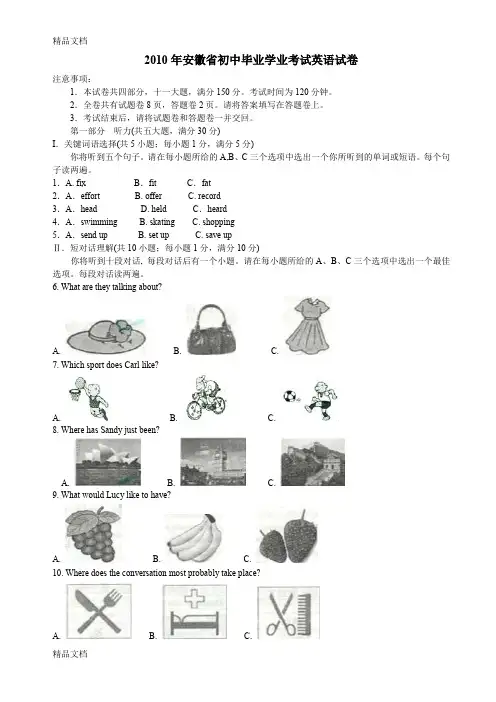
2010年安徽省初中毕业学业考试英语试卷注意事项:1.本试卷共四部分,十一大题,满分150分。
考试时间为120分钟。
2.全卷共有试题卷8页,答题卷2页。
请将答案填写在答题卷上。
3.考试结束后,请将试题卷和答题卷一并交回。
第一部分听力(共五大题,满分30分)I.关键词语选择(共5小题;每小题1分,满分5分)你将听到五个句子。
请在每小题所给的A,B、C三个选项中选出一个你所听到的单词或短语。
每个句子读两遍。
1.A. fix B.fit C.fat2.A.effort B. offer C. record3.A.head D. held C.heard4.A.swimming B. skating C. shopping5.A.send up B. set up C. save upⅡ.短对话理解(共10小题;每小题1分,满分10分)你将听到十段对话, 每段对话后有一个小题。
请在每小题所给的A、B、C三个选项中选出一个最佳选项。
每段对话读两遍。
6. What are they talking about?A. B. C.7. Which sport does Carl like?A. B. C.8. Where has Sandy just been?A. B. C.9. What would Lucy like to have?A. B. C.10. Where does the conversation most probably take place?A. B. C.11. What are they going to do this weekend?A. To play chess.B. To play volleyball.C. To play tennis.12. What is the man doing?A. Looking for a job.B. Posting a letter.C. Asking the way.13. What time is it now?A. 8:30.B. 9:00.C. 9:30.Ⅱ.短对话理解(共10小题14. What’s the relationship between them?A. Driver and passenger.B. Father and daughter.C. Manager and secretary.15. Why hasn’t Helen read th e email?A. Because she is too busy.B. Because she has a bad cold.C. Because her computer doesn’t work.III. 长对话理解(共5小题;每小题1分,满分5分)你将听到两段对话,每段对话后有几个小题。
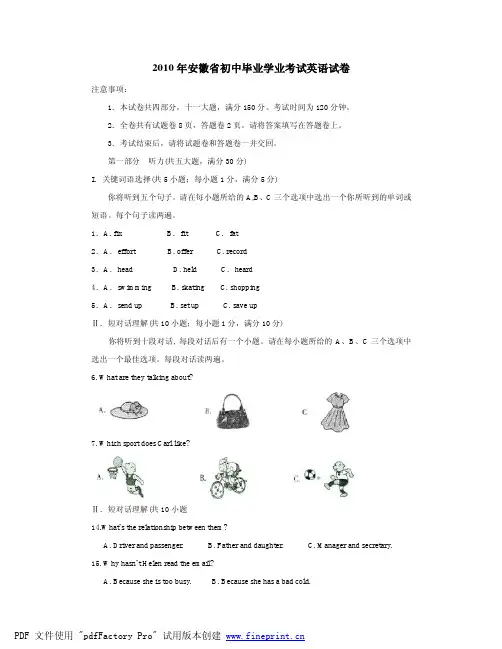
2010年安徽省初中毕业学业考试英语试卷注意事项:1.本试卷共四部分,十一大题,满分150分。
考试时间为120分钟。
2.全卷共有试题卷8页,答题卷2页。
请将答案填写在答题卷上。
3.考试结束后,请将试题卷和答题卷一并交回。
第一部分听力(共五大题,满分30分)I.关键词语选择(共5小题;每小题1分,满分5分)你将听到五个句子。
请在每小题所给的A,B、C三个选项中选出一个你所听到的单词或短语。
每个句子读两遍。
1.A. fix B.fit C.fat2.A.effort B. offer C. record3.A.head D. held C.heard4.A.swimming B. skating C. shopping5.A.send up B. set up C. save upⅡ.短对话理解(共10小题;每小题1分,满分10分)你将听到十段对话, 每段对话后有一个小题。
请在每小题所给的A、B、C三个选项中选出一个最佳选项。
每段对话读两遍。
6. What are they talking about?7. Which sport does Carl like?Ⅱ.短对话理解(共10小题14.What’s the relationship between them?A. Driver and passenger.B. Father and daughter.C. Manager and secretary.15. Why hasn’t Helen read the email?A. Because she is too busy.B. Because she has a bad cold.C. Because her computer doesn’t work.III. 长对话理解(共5小题;每小题1分,满分5分)你将听到两段对话,每段对话后有几个小题。
请在每小题所给的A、B、C三个选项中选出一个最佳选项。
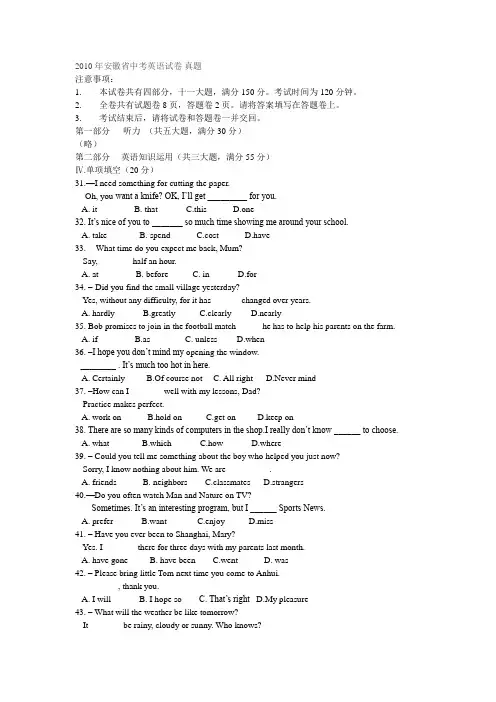
2010年安徽省中考英语试卷真题注意事项:1. 本试卷共有四部分,十一大题,满分150分。
考试时间为120分钟。
2. 全卷共有试题卷8页,答题卷2页。
请将答案填写在答题卷上。
3. 考试结束后,请将试卷和答题卷一并交回。
第一部分听力(共五大题,满分30分)(略)第二部分英语知识运用(共三大题,满分55分)Ⅳ.单项填空(20分)31.—I need something for cutting the paper.-- Oh, you want a knife? OK, I’ll get _________ for you.A. itB. thatC.thisD.one32. It’s nice of you to _______ so much time showing me around your school.A. takeB. spendC.costD.have33. -- What time do you expect me back, Mum?-- Say, _______ half an hour.A. atB. beforeC. inD.for34. –-Did you find the small village yesterday?-- Yes, without any difficulty, for it has ______ changed over years.A. hardlyB.greatlyC.clearlyD.nearly35. Bob promises to join in the football match _____ he has to help his parents on the farm.A. ifB.asC. unlessD.when36. –I hope you don’t mind my opening the window.--________ . It’s much too hot in here.A. CertainlyB.Of course notC. All rightD.Never mind37. –How can I ______ well with my lessons, Dad?-- Practice makes perfect.A. work onB.hold onC.get onD.keep on38. There are so many kinds of computers in the shop.I really don’t know ______ to choose.A. whatB.whichC.howD.where39. – Could you tell me something about the boy who helped you just now?-- Sorry, I know nothing about him. We are _________ .A. friendsB. neighborsC.classmatesD.strangers40.—Do you often watch Man and Nature on TV?-- Sometimes. It’s an interesting program, but I ______ Sports News.A. preferB.wantC.enjoyD.miss41. – Have you ever been to Shanghai, Mary?-- Yes. I _______ there for three days with my parents last month.A. have goneB. have beenC.wentD. was42. – Please bring little Tom next time you come to Anhui.-- ________, thank you.A. I willB. I hope soC. That’s rightD.My pleasure43. – What will the weather be like tomorrow?-- It _______ be rainy, cloudy or sunny. Who knows?A. mustB.mightC.shallD.should44. –Are you going to the party?-- No, because I __________ .A. have askedB.haven’t askedC.have been askedD.have’t been asked45.The teacher asked the boy many questions,but he only answered ___ of them.A.someB. lotsC. eachD.few46. – It seems that Alice never wants to do anything axcept draw pictures.-- Right. That’s what she likes to do ________.A. moreB. lessC.mostD.least47. –Why didn’t you go to the cinema with us this afternoon?-- I ______ at the station for my uncle from Beijing.A. was waitingB.have waitedC.am waitingD.will wait48. –Dad, it’s such a long way from our home to the park!-- You mean it’s ________ to take a taxi?A. popularB.necessaryC.possibleD.important49.—Excuse me. May I use your eraser, please?--Sure. _________A. Watch out!B.Well done!C.Go ahead.D.Follow me.50. I couldn’t get through the door because there was a big box ________.A.by the wayB.on the wayC.out of the wayD. in the wayⅦ.完形填空(30分)AA group of frogs were travelling through the forests, but unluckily two of them fell into a hole. The other frogs tried to help them. When they saw how 51 the hole was, they cried to the two frogs that they could not be saved. The two frogs didn’t 52 and tried their best to jump out of the hole. The other frogs 53 saying that they were sure to die. 54 , one of the two frogs, who heard what the other forgs were saying, 55 . Then he fell down and died.The other frog, however, 56 to jump as hard as he could, and at last made it out. When he 57 , the other frogs asked, ―Didn’t you hear us?‖ T he frog, who had a poor 58 ,explained, ―I thought you were encouraging me all the time.‖The story teaches us a 59 : There is a power (力量)of life and death in the tongue. An 60 word to those who are down can help them out while a discouraging word can kill them.51. A. small B. deep C. big D. wide52. A. care B. refuse C. insist D. think53. A. kept B. finished C. practised D. stopped54. A. Luckily B. Finally C. Suddenly D. Happily55. A. went on B. ran away C. jumped out D. gave up56. A. happened B. continued C. planned D. wanted57. A. got out B. ran away C. got off D. woke up58. A. smelling B. eyesight C. hearing D. looking59. A. way B. skill C. sentence D. lesson60. A. interesting B. exciting C. excellent D. encouragingBEverybody dreams.Some people think dreams can tell us about the future.Other people think dreams tell us about ourselves. It’s like our61 is talking to us.Why are dreams 62 strange and hard to understand? Some people think our brain uses 63 to talk to us. When we fly, swim, or fall down in our dreams, it has a 64 meaning. Lots of doctors help people 65 their dreams. They find that dreams tell us about our 66 and fears.These days, many scientists 67 that dreams are very important. During the day, we have many 68 , and our brain receives a lot of information. When we dream, our brain 69 information that is not important, and puts the most important information into our 70 .As we learn about the brain, we may find answers to our questions about dreams.61.A.body B.spirit C.brain D.heart62.A.never B.seldom C.ever D.often63.A.symbols B.examples C.numbers D.pictures64.A.special B.serious C.similar D.great65.A.finish B.forget C.understand D.continue66.A.hopes B.rights C.positions D.abilities67.A.reply B.believe C.doubt D.worry68.A.experiences B.dreams C.mistakes D.inventions69.A.passes on B.looks into C.throws away D.asks for70.A.feelings B.stories C.lives D.memoriesⅧ.补全对话(5分)A: What’s the date today?B: It’s June 16.A: 71 Then it’s Dragon Boat Festival today, isn’t it?B: Yes. 72 .A: Did you have rice dumplings this morning?B: Sure. 73A: I didn’t.B: What a pity! But I happen to have got some with me. 74A: I’d love to. By the way, why do you call it Dragon Boat Festival?B: Because in China, people race dragon boats this day every year.A: Oh,I see. 75B: You are welcome.A. We Chinese usually eat rice dumplings this day.B. I hate eating rice dumplings.C. Thank you for your rice dumplings.D. I don’t think so.E. Would you like to have one?F. Already?G. How about you?Ⅸ.阅读理解(40分)ALiving in a foreign culture can be exciting, but it can also be confusing(令人迷惑的).A group of Americans who taught English in other countries recently discussed their experiences. Theydecided that miscommunications were always possible, even over something as simple as ―yes‖and ―no‖.On her first day in Micronesia, an island in the Pacific, Lisa thought peo ple weren’t paying any attention to her. The day was hot. She went ito a store and asked, ―Do you have cold drinks?‖ The woman there didn’t say anything. Lisa repeated the question. Still the woman said nothing. She later learned that the woman had answered her: She had raised her eyebrows(眉毛),which in Micronesia means ―yes‖.Jan remembered an experience she had in Bulgaria, a country in Europe. She went to a restaurant that was known for its cabbage. She asked the waiter, ―Do you have cabbage today?‖ He no dded his head. Jan waited, but the cabbage never came. In that country, a nod means ―no‖.Tom had a similar problem when arrived in India. After explaining something in class, he asked his students if they understood. They answered with many different nods and shakes of the head. He thought some people had not understood, so he explained again. When he asked again, they did the same thing. He soon found out that his students did understand. In India, people nod and shake their heads in different ways depending on where they come from. You have to know wherea person is from to understand whether they mean ―yes‖or ―no‖.76.The Americans teaching English in other countries found that they ______.A.should go abroad for vacationsB.needed to learn foreign languagesC.should often discuss their experiencesD.had problems with communications77.People in Micronesia show ―yes‖by _________.A.nodding headsB.raising eyebrowsC.shaking headsD.saying ―no‖78.Tom misunderstood his class at first because ______ .A.he did not know much about Indian cultureB.he didn’t explain everything clearly enoughC.some students didn’t u nderstand his questionsD.he didn’t know where the students came from79.Which of the following is TRUE according to this passage?A.In Bulgaria,nodding heads means ―no‖.B.Jan taught English on a Pacific island.C.Lisa was trying to buy some cabbage.D.In India,only shaking heads means ―yes‖.80.The passage is mainly about _______.A.body language in foreign restaurantsB.class discussion in India schoolsC.miscommunication in different culturesD.English teaching in other countries.。
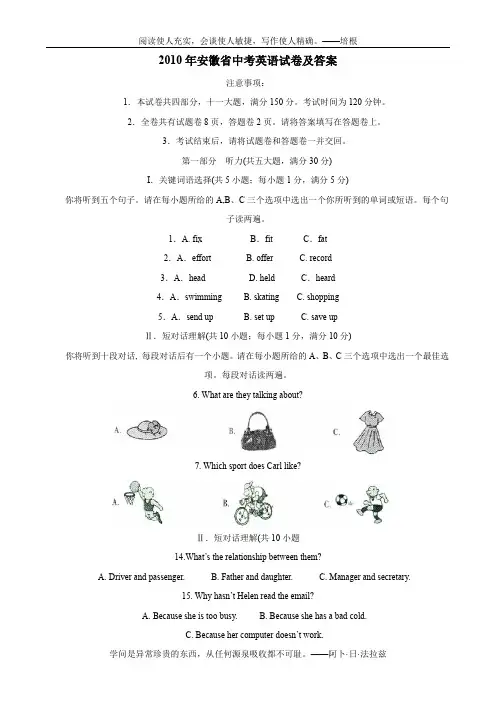
阅读使人充实,会谈使人敏捷,写作使人精确。
——培根2010年安徽省中考英语试卷及答案注意事项:1.本试卷共四部分,十一大题,满分150分。
考试时间为120分钟。
2.全卷共有试题卷8页,答题卷2页。
请将答案填写在答题卷上。
3.考试结束后,请将试题卷和答题卷一并交回。
第一部分听力(共五大题,满分30分)I.关键词语选择(共5小题;每小题1分,满分5分)你将听到五个句子。
请在每小题所给的A,B、C三个选项中选出一个你所听到的单词或短语。
每个句子读两遍。
1.A. fix B.fit C.fat2.A.effort B. offer C. record3.A.head D. held C.heard4.A.swimming B. skating C. shopping5.A.send up B. set up C. save upⅡ.短对话理解(共10小题;每小题1分,满分10分)你将听到十段对话, 每段对话后有一个小题。
请在每小题所给的A、B、C三个选项中选出一个最佳选项。
每段对话读两遍。
6. What are they talking about?7. Which sport does Carl like?Ⅱ.短对话理解(共10小题14.What’s the relationship between them?A. Driver and passenger.B. Father and daughter.C. Manager and secretary.15. Why hasn’t Helen read the email?A. Because she is too busy.B. Because she has a bad cold.C. Because her computer doesn’t work.III. 长对话理解(共5小题;每小题1分,满分5分)你将听到两段对话,每段对话后有几个小题。
请在每小题所给的A、B、C三个选项中选出一个最佳选项。
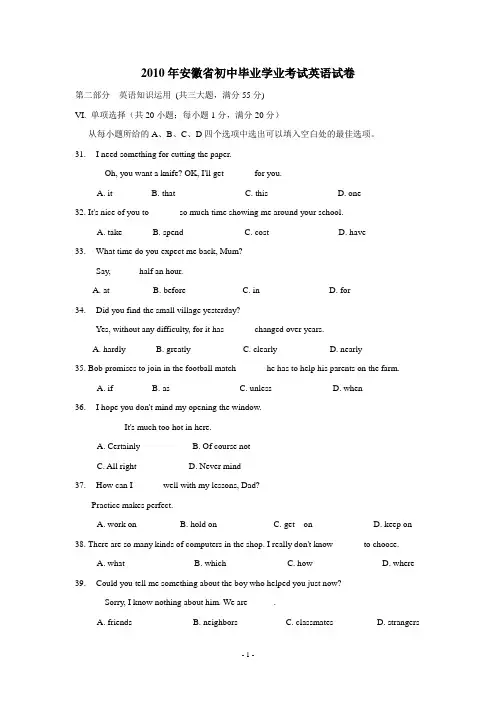
2010年安徽省初中毕业学业考试英语试卷第二部分英语知识运用(共三大题,满分55分)VI. 单项选择(共20小题;每小题1分,满分20分)从每小题所给的A、B、C、D四个选项中选出可以填入空白处的最佳选项。
31. -- I need something for cutting the paper.-- Oh, you want a knife? OK, I'll get ______ for you.A. itB. thatC. thisD. one32. It's nice of you to ______ so much time showing me around your school.A. takeB. spendC. costD. have33. -- What time do you expect me back, Mum?-- Say, ______half an hour.A. atB. beforeC. inD. for34. -- Did you find the small village yesterday?-- Yes, without any difficulty, for it has ______ changed over years.A. hardlyB. greatlyC. clearlyD. nearly35. Bob promises to join in the football match ______ he has to help his parents on the farm.A. ifB. asC. unlessD. when36. -- I hope you don't mind my opening the window.-- ______ It's much too hot in here.A. CertainlyB. Of course notC. All rightD. Never mind37. -- How can I ______ well with my lessons, Dad?-- Practice makes perfect.A. work onB. hold onC. get onD. keep on38. There are so many kinds of computers in the shop. I really don't know ______ to choose.A. whatB. whichC. howD. where39. -- Could you tell me something about the boy who helped you just now?-- Sorry, I know nothing about him. We are______.A. friendsB. neighborsC. classmatesD. strangers40. -- Do you often watch Man and Nature on TV?--Sometimes. It's an interesting program, but I______ Sports News.A. preferB. wantC. enjoyD. miss41. -- Have you ever been to Shanghai, Mary?-- Yes. I _______ there for three clays with my parents last month.A. have goneB. have beenC. wentD. was42. -- Please bring little Tom next time you come to Anhui.--______, thank you.A. I willB. I hope soC. That's rightD. My pleasure43. -- What will the weather be like tomorrow?-- It ______ be rainy, cloudy or sunny. Who knows?A. mustB. mightC. shallD. should44. -- Are you going to the party?-- No, because I ______.A. have askedB. haven't askedC. have been askedD. haven't been asked45. The teacher asked the boy many questions, but he only answered ______ of them.A. someB. lotsC. eachD. few46. -- It seems that Alice never wants to do anything except draw pictures.-- Right. That's what she likes to do ______.A. moreB. lessC. mostD. least47. -- Why didn't you go to the cinema with us this afternoon?-- I ______ at the station for my uncle from Beijing.A. was waitingB. have waitedC. am waitingD. will wait48. -- Dad, it's such a long way from our home to the park!-- You mean it's ______ to take a taxi?A. popularB. necessaryC. possibleD. important49. -- Excuse me. May I use your eraser, please?-- Sure. ______A. Watch out!B. Well done!C. Go ahead.D. Follow me.50. I couldn't get through the door because there was a big box ______.A. by the wayB. on the wayC. out of the wayD. in the wayVII. 完形填空(共20小题;每小题1.5分,满分30分)阅读下列短文,从每小题所给的A、B、C、D四个选项中选出最佳选项。
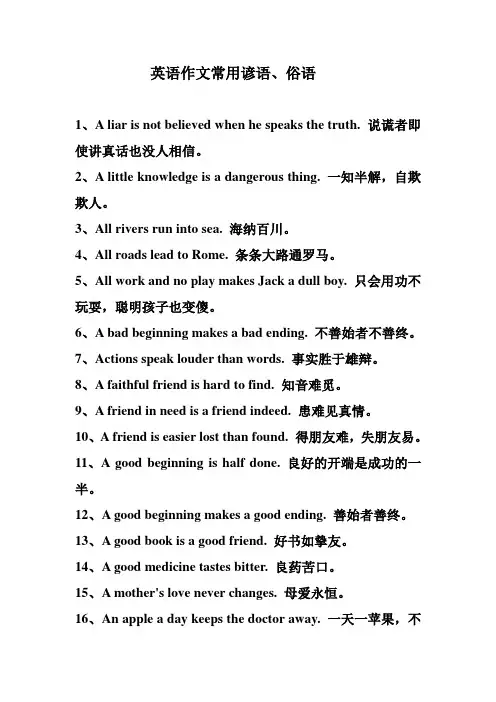
英语作文常用谚语、俗语1、A liar is not believed when he speaks the truth. 说谎者即使讲真话也没人相信。
2、A little knowledge is a dangerous thing. 一知半解,自欺欺人。
3、All rivers run into sea. 海纳百川。
4、All roads lead to Rome. 条条大路通罗马。
5、All work and no play makes Jack a dull boy. 只会用功不玩耍,聪明孩子也变傻。
6、A bad beginning makes a bad ending. 不善始者不善终。
7、Actions speak louder than words. 事实胜于雄辩。
8、A faithful friend is hard to find. 知音难觅。
9、A friend in need is a friend indeed. 患难见真情。
10、A friend is easier lost than found. 得朋友难,失朋友易。
11、A good beginning is half done. 良好的开端是成功的一半。
12、A good beginning makes a good ending. 善始者善终。
13、A good book is a good friend. 好书如挚友。
14、A good medicine tastes bitter. 良药苦口。
15、A mother's love never changes. 母爱永恒。
16、An apple a day keeps the doctor away. 一天一苹果,不用请医生。
17、A single flower does not make a spring. 一花独放不是春,百花齐放春满园。
18、A year's plan starts with spring. 一年之计在于春。
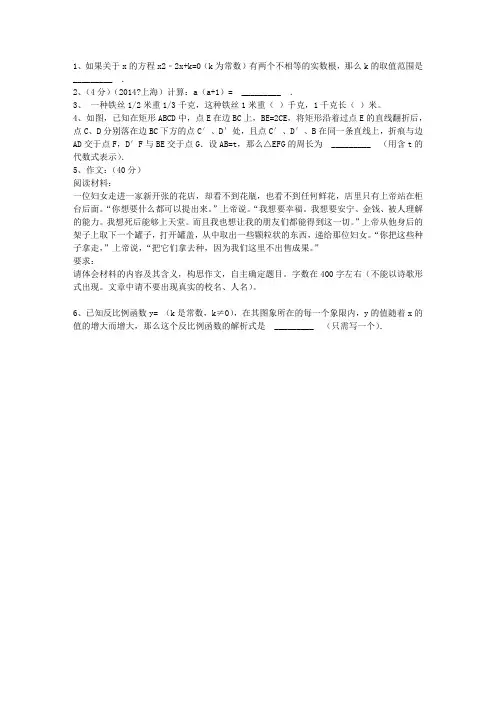
1、如果关于x的方程x2﹣2x+k=0(k为常数)有两个不相等的实数根,那么k的取值范围是_________ .
2、(4分)(2014?上海)计算:a(a+1)= _________ .
3、一种铁丝1/2米重1/3千克,这种铁丝1米重()千克,1千克长()米。
4、如图,已知在矩形ABCD中,点E在边BC上,BE=2CE,将矩形沿着过点E的直线翻折后,点C、D分别落在边BC下方的点C′、D′处,且点C′、D′、B在同一条直线上,折痕与边AD交于点F,D′F与BE交于点G.设AB=t,那么△EFG的周长为_________ (用含t的代数式表示).
5、作文:(40分)
阅读材料:
一位妇女走进一家新开张的花店,却看不到花瓶,也看不到任何鲜花,店里只有上帝站在柜台后面。
“你想要什么都可以提出来。
”上帝说。
“我想要幸福。
我想要安宁、金钱、被人理解的能力。
我想死后能够上天堂。
而且我也想让我的朋友们都能得到这一切。
”上帝从他身后的架子上取下一个罐子,打开罐盖,从中取出一些颗粒状的东西,递给那位妇女。
“你把这些种子拿走,”上帝说,“把它们拿去种,因为我们这里不出售成果。
”
要求:
请体会材料的内容及其含义,构思作文,自主确定题目。
字数在400字左右(不能以诗歌形式出现。
文章中请不要出现真实的校名、人名)。
6、已知反比例函数y= (k是常数,k≠0),在其图象所在的每一个象限内,y的值随着x的值的增大而增大,那么这个反比例函数的解析式是_________ (只需写一个).。
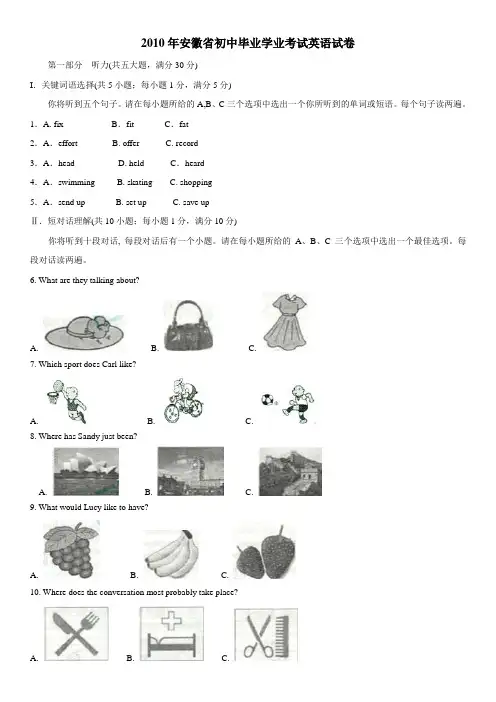
2010年安徽省初中毕业学业考试英语试卷第一部分听力(共五大题,满分30分)I.关键词语选择(共5小题;每小题1分,满分5分)你将听到五个句子。
请在每小题所给的A,B、C三个选项中选出一个你所听到的单词或短语。
每个句子读两遍。
1.A. fix B.fit C.fat2.A.effort B. offer C. record3.A.head D. held C.heard4.A.swimming B. skating C. shopping5.A.send up B. set up C. save upⅡ.短对话理解(共10小题;每小题1分,满分10分)你将听到十段对话, 每段对话后有一个小题。
请在每小题所给的A、B、C三个选项中选出一个最佳选项。
每段对话读两遍。
6. What are they talking about?A. B. C.7. Which sport does Carl like?A. B. C.8. Where has Sandy just been?A. B. C.9. What would Lucy like to have?A. B. C.10. Where does the conversation most probably take place?A. B. C.11. What are they going to do this weekend?A. To play chess.B. To play volleyball.C. To play tennis.12. What is the man doing?A. Looking for a job.B. Posting a letter.C. Asking the way.13. What time is it now?A. 8:30.B. 9:00.C. 9:30.Ⅱ.短对话理解(共10小题14. What’s the relationship between them?A. Driver and passenger.B. Father and daughter.C. Manager and secretary.15. Why hasn’t Helen read the email?A. Because she is too busy.B. Because she has a bad cold.C. Because her computer doesn’t work.III. 长对话理解(共5小题;每小题1分,满分5分)你将听到两段对话,每段对话后有几个小题。
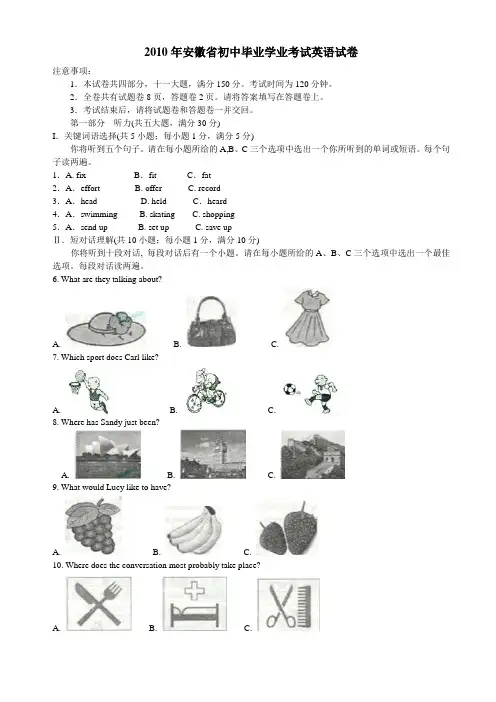
2010年安徽省初中毕业学业考试英语试卷注意事项:1.本试卷共四部分,十一大题,满分150分。
考试时间为120分钟。
2.全卷共有试题卷8页,答题卷2页。
请将答案填写在答题卷上。
3.考试结束后,请将试题卷和答题卷一并交回。
第一部分听力(共五大题,满分30分)I.关键词语选择(共5小题;每小题1分,满分5分)你将听到五个句子。
请在每小题所给的A,B、C三个选项中选出一个你所听到的单词或短语。
每个句子读两遍。
1.A. fix B.fit C.fat2.A.effort B. offer C. record3.A.head D. held C.heard4.A.swimming B. skating C. shopping5.A.send up B. set up C. save upⅡ.短对话理解(共10小题;每小题1分,满分10分)你将听到十段对话, 每段对话后有一个小题。
请在每小题所给的A、B、C三个选项中选出一个最佳选项。
每段对话读两遍。
6. What are they talking about?A. B. C.7. Which sport does Carl like?A. B. C.8. Where has Sandy just been?A. B. C.9. What would Lucy like to have?A. B. C.10. Where does the conversation most probably take place?A. B. C.11. What are they going to do this weekend?A. To play chess.B. To play volleyball.C. To play tennis.12. What is the man doing?A. Looking for a job.B. Posting a letter.C. Asking the way.13. What time is it now?A. 8:30.B. 9:00.C. 9:30.Ⅱ.短对话理解(共10小题14. What’s the relationship between them?A. Driver and passenger.B. Father and daughter.C. Manager and secretary.15. Why hasn’t Helen read the email?A. Because she is too busy.B. Because she has a bad cold.C. Beca use her computer doesn’t work.III. 长对话理解(共5小题;每小题1分,满分5分)你将听到两段对话,每段对话后有几个小题。
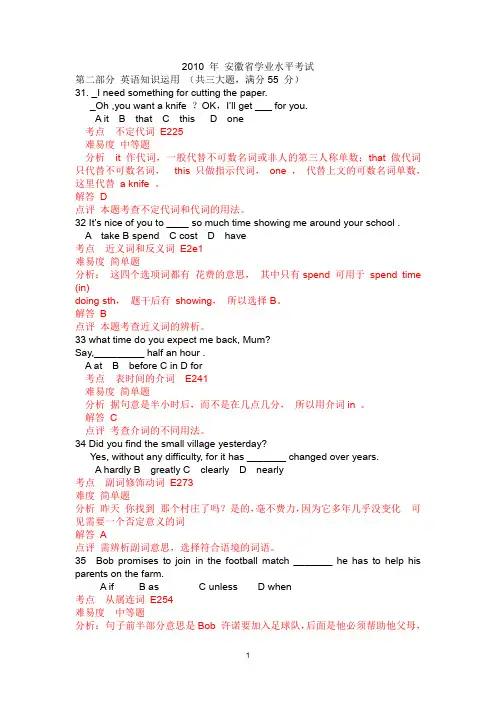
2010 年安徽省学业水平考试第二部分英语知识运用(共三大题,满分55 分)31. _I need something for cutting the paper._Oh ,you want a knife ?OK,I’ll get ___ for you.A itB thatC thisD one考点不定代词E225难易度中等题分析it 作代词,一般代替不可数名词或非人的第三人称单数;that 做代词只代替不可数名词,this 只做指示代词,one ,代替上文的可数名词单数,这里代替a knife 。
解答D点评本题考查不定代词和代词的用法。
32 It’s nice of you to ____ so much time showing me around your school .A takeB spendC costD have考点近义词和反义词E2e1难易度简单题分析:这四个选项词都有花费的意思,其中只有spend 可用于spend time (in)doing sth,题干后有showing,所以选择B。
解答B点评本题考查近义词的辨析。
33 what time do you expect me back, Mum?Say,_________ half an hour .A atB beforeC inD for考点表时间的介词E241难易度简单题分析据句意是半小时后,而不是在几点几分,所以用介词in 。
解答 C点评考查介词的不同用法。
34 Did you find the small village yesterday?Yes, without any difficulty, for it has _______ changed over years.A hardlyB greatlyC clearlyD nearly考点副词修饰动词E273难度简单题分析昨天你找到那个村庄了吗?是的,毫不费力,因为它多年几乎没变化可见需要一个否定意义的词解答A点评需辨析副词意思,选择符合语境的词语。
英语试卷本试卷分卷Ⅰ和卷Ⅱ两部分。
卷Ⅰ为选择题,卷Ⅱ为非选择题。
本试卷共120分,考试时间120分钟。
卷I(选择题,共85分)注意事项:1.答卷Ⅰ前,考生务必将自己的姓名、准考证号、科目填涂在答题卡上。
考试结束,监考人员将试卷和答题卡一并收回。
2.每小题选出答案后,用2B铅笔把答题卡上对应题目的答案标号涂黑。
答在试卷上无效。
3.听力部分共包括两小节:第一节在卷Ⅰ,第二节在卷Ⅱ。
完成第一节后,请根据录音指令,在卷Ⅱ完成第二节。
听力部分(第一节)Ⅰ. 听句子,选出句子中所包含的信息。
(共5小题,每小题1分,计5分)1. A. ice B. rice C. voice2. A. E2CR3F B. B2CR7F C. B2OR6F3. A. talking on the phone B. waiting for a phone C. shouting at the phone4. A. Jim is younger. B. Tony is younger. C. They are the same age.5. A. Laugh is good medicine.B. Always take cheap medicine.C. Medicine can make you laugh.Ⅱ. 听句子,选出该句的最佳答语。
(共5小题,每小题1分,计5分)6. A. You are so kind. B. Thanks, you too! C. That would be fine.7. A. I play the piano. B. I go to work. C. I’m a policeman.8. A. Twenty-eight yuan. B. Three hundred miles. C. Two and a half years.9. A. Yes, please. B. Sorry, I can’t. C. Never mind.10. A. But it is not true. B. I don’t believe in God. C. Wow, it’s already 12 o’clock!Ⅲ. 听对话和问题,选择正确的选项。
中考英语模拟试卷第一部分知识运用(共两节,满分30分)一、完形填空(共15小题,每小题1分,满分15分)阅读下面的短文,掌握其大意,然后从短文后各题所给的A,B,C三个选项中,选出可以填入空白处的最佳选项。
In a digital age, we almost never write things by hand. However, many studies have shown that this act has many benefits(益处).New brain research, led by researchers at the Norwegian University of Science and Technology, announces the same: choosing handwriting over using a keyboard results in better learning and memory.“When you write your shopping list or notes by hand, you simply remember things better after some time,” said Audrey van der Meer, author of the study.The study was done using equipment to track and record brain wave activity. 12 young adults and 12 children took part in the study. Each person was asked to write by hand and type on a keyboard while wearing a hood(风帽)with over 250 electrodes(电极). The sensors(传感器)in the electrodes are very sensitive and catch the electrical activity that takes place in the brain. Each examination took 45 minutes per person.The results show that the brain in both young adults and children is much more active when writing by hand than when typing on a keyboard. According to Van der Meer, plenty of senses are activated by pressing a pen on paper, seeing the letters written and hearing the sound made while writing. These sense experiences build connections between different parts of the brain, opening the brain up for learning.Van der Meer believes that the results show the importance of children’s learning to draw and write at an early age, especially at school. “Learning to write by hand is a bit slower process, but it’s important for children to go through the tiring process of learning to write by hand,” she said.The hand movements are good for us in many ways. “If you use a keyboard, you use the same movement for each letter. Writing by hand requires control of your skills and senses. It is important to put the brain in a learning state as often as possible,” V an der Meer added. “You might use a keyboard to write an article, but you should learn by hand during a class.”42. What advantage does choosing handwriting have over using keyboard?A. It’s more challenging.B. It’s better for learning and memory.C. It’s less likely to cause tiredness.D. It’s more popular among students.43. According to the passage, when you are writing by hand, ________.A. your brain is more activeB. your senses are hard to be activatedC. you take more time to studyD. your hand uses the same movement44. What do we know about the study?A. 12 people took part in the study.B. The study focused on using a keyboard.C. The study was designed only for children.D. The study was to tell the importance of handwriting.45. What is the main idea of the text?A. Handwriting brings people many benefits.B. The interest in handwriting is growing nowadays.C. Learning environment is important for the young.D. Learning is controlled by the ways of memorizing.二、阅读下面三篇材料,从每题所给的A,B,C三个选项中,选出最佳选项回答问题或完成句子。
2010年安徽省初中毕业学业考试英语试卷注意事项:1.本试卷共四部分,十一大题,满分150分。
考试时间为120分钟。
2.全卷共有试题卷8页,答题卷2页。
请将答案填写在答题卷上。
3.考试结束后,请将试题卷和答题卷一并交回。
第一部分听力(共五大题,满分30分)I.关键词语选择(共5小题;每小题1分,满分5分)你将听到五个句子。
请在每小题所给的A,B、C三个选项中选出一个你所听到的单词或短语。
每个句子读两遍。
1.A. fix B.fit C.fat2.A.effort B. offer C. record3.A.head D. held C.heard4.A.swimming B. skating C. shopping5.A.send up B. set up C. save upⅡ.短对话理解(共10小题;每小题1分,满分10分)你将听到十段对话, 每段对话后有一个小题。
请在每小题所给的A、B、C三个选项中选出一个最佳选项。
每段对话读两遍。
6. What are they talking about?7. Which sport does Carl like?Ⅱ.短对话理解(共10小题14.What’s the relationship between them?A. Driver and passenger.B. Father and daughter.C. Manager and secretary.15. Why hasn’t Helen read the ema il?A. Because she is too busy.B. Because she has a bad cold.C. Because her computer doesn’t work.III. 长对话理解(共5小题;每小题1分,满分5分)你将听到两段对话,每段对话后有几个小题。
请在每小题所给的A、B、C三个选项中选出一个最佳选项。
每段对话读两遍。
听下面一段对话,回答第16到17小题。
16. What is Maggie?A. A teacher.B. A student.C. A policewoman.17. What does Maggie think of Jason’s job?A. Great.B. Dangerous.C. Boring.听下面一段对话,回答第18到20小题。
18. Who is answering the telephone call?A. Susan.B. Robert.C. Richard.19. Wha t’s Susan going to do tomorrow morning?A. To visit the museum.B. To go to the park.C. to stay home and study20. How are they going there?A. By bike.B. By taxi.C. By bus.IV. 短文理解(共5小题;每小题1分,满分5分)你将听到一篇短文,短文后有5个小题。
请根据短文内容,在每小题所给的A、B、C三个选项中选出一个最佳选项。
短文读两篇。
21. Where does Jack live in England?A. In a village.B. On a farm.C. In a town.22. What did he go to Russia for?A. He went there on business.B. He went there for holiday.C. He went to visit his friends.23. How long did he stay in Russia?A. For a few days.B. For a few weeks.C. For a few months.24. Why was he almost knocked down?A. Because the street was too busy.B. Because he was walking in a hurry.C. Because he forgot the traffic rules there.25. What did the old man mean?A. He wanted to help Jack.B. He told Jack where he was.C. He wanted to sell maps to Jack.V. 信息转换(共5小题;每小题1分,满分5分)你将听到一篇短文。
请根据短文内容,写出下面表格中所缺的单词,每空仅填一词。
短文读两遍。
第二部分英语知识运用(共三大题,满分55分)VI. 单项选择(共20小题;每小题1分,满分20分)从每小题所给的A、B、C、D四个选项中选出可以填入空白处的最佳选项。
31. -- I need something for cutting the paper.-- Oh, you want a knife? OK, I'll get ______ for you.A. itB. thatC. thisD. one32. It's nice of you to ______ so much time showing me around your school.A. takeB. spendC. costD. have33. -- What time do you expect me back, Mum?-- Say, ______half an hour.A. atB. beforeC. inD. for34. -- Did you find the small village yesterday?-- Yes, without any difficulty, for it has ______ changed over years.A. hardlyB. greatlyC. clearlyD. nearly35. Bob promises to join in the football match ______ he has to help his parents on the farm.A. ifB. asC. unlessD. when36. -- I hope you don't mind my opening the window.-- ______ It's much too hot in here.A. CertainlyB. Of course notC. All rightD. Never mind37. -- How can I ______ well with my lessons, Dad?-- Practice makes perfect.A. work onB. hold onC. get onD. keep on38. There are so many kinds of computers in the shop. I really don't know ______ to choose.A. whatB. whichC. howD. where39. -- Could you tell me something about the boy who helped you just now?-- Sorry, I know nothing about him. We are______.A. friendsB. neighborsC. classmatesD. strangers40. -- Do you often watch Man and Nature on TV?--Sometimes. It's an interesting program, but I______ Sports News.A. preferB. wantC. enjoyD. miss41. -- Have you ever been to Shanghai, Mary?-- Yes. I _______ there for three clays with my parents last month.A. have goneB. have beenC. wentD. was42. -- Please bring little Tom next time you come to Anhui.--______, thank you.A. I willB. I hope soC. That's rightD. My pleasure43. -- What will the weather be like tomorrow?-- It ______ be rainy, cloudy or sunny. Who knows?A. mustB. mightC. shallD. should44. -- Are you going to the party?-- No, because I ______.A. have askedB. haven't askedC. have been askedD. haven't been asked45. The teacher asked the boy many questions, but he only answered ______ of them.A. someB. lotsC. eachD. few46. -- It seems that Alice never wants to do anything except draw pictures.-- Right. That's what she likes to do ______.A. moreB. lessC. mostD. least47. -- Why didn't you go to the cinema with us this afternoon?-- I ______ at the station for my uncle from Beijing.A. was waitingB. have waitedC. am waitingD. will wait48. -- Dad, it's such a long way from our home to the park!-- You mean it's ______ to take a taxi?A. popularB. necessaryC. possibleD. important49. -- Excuse me. May I use your eraser, please?-- Sure. ______A. Watch out!B. Well done!C. Go ahead.D. Follow me.50. I couldn't get through the door because there was a big box ______.A. by the wayB. on the wayC. out of the wayD. in the wayVII. 完形填空(共20小题;每小题1.5分,满分30分)阅读下列短文,从每小题所给的A、B、C、D四个选项中选出最佳选项。